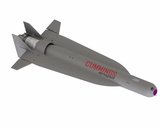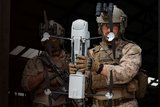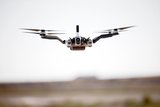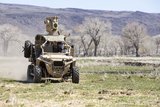Air Guard should keep UAS missions
The Air National Guard should remain in the unmanned aircraft systems business now and in the future, the chairman of the service's UAS weapons system council said Aug. 17.
Col. Bob Becklund, who is also the commander of the 119th Wing in Fargo, N.D., said his attendance at the Association for Unmanned Vehicle Systems International's Unmanned System North America 2009 Convention here this week reinforced his opinion.
"It keeps getting bigger every year," he said about the convention. "It is a perfect example of how the UAS industry is growing everywhere -- civilian and military."
More than 320 unmanned aircraft, maritime and ground systems were on display, offering the industries' latest products and innovations.
The Air National Guard currently has four MQ-1 Predator units: the 119th in Fargo, the 214th Reconnaissance Squadron in Tucson, Ariz., the 163rd Reconnaissance Wing at March Air Reserve Base, Calif., and the 147th RW in Houston.
The 174th Fighter Wing at Syracuse, N.Y., which was the first Air Guard unit to get F-16s, will be the first Air Guard unit to get the MQ-9 Reaper. They are scheduled to be operational in October, and will start a schoolhouse for maintainers in November. The 163rd RW is also a training site for pilots and mechanics.
The Air Force's 40-year flight path for the UAS shows an increase in the MQ-9 mission, and Colonel Becklund said there is a push to get them into the Air Guard.
He added that he is not surprised that the Air Force is training more operators than fighter pilots.
"The number of aircraft in the Air Force has stayed level or is going down and UASs are going up," he said. "Much emphasis is being put on the UASs these days."
Colonel Becklund said his state predicted this inevitability about 10 years ago. "We positioned ourselves in BRAC 2005 to receive the Predator. We prepared mentally and organizationally to jump into the Predator."
It wasn't an easy transition, but all of their planning paid off in the end, and "it has been reflected in our performance already," he said.
The Air Guard's four UAS units currently are flying remote split operations from ground control stations at their home bases. The Predator aircraft are in Iraq and Afghanistan.
Colonel Becklund said each unit has personnel assigned to keep two orbits airborne around the clock. "Even though we're not physically there, the pilots have to project their minds forward (to the battlefield). You need to be there mentally with them."
Colonel Becklund admitted this arrangement is a "two-edged sword." When you deploy with a unit, "it is a lot easier to focus on the mission ... but when you're at home flying these combat missions ... it's harder to turn it on and turn it off every day. So, that is probably the biggest challenge that we have."
Despite this, Colonel Becklund said the technology and operational techniques and procedures are advancing so fast, so "there is nothing but opportunity out there. It's a cultural change for units ... (but) the way of the future is in UASs."
by Lt. Col. Ellen Krenke, National Guard Bureau
More from Uncrewed Vehicles
-
![Cummings Aerospace showcases Hellhound loitering munition designed for US Army’s LASSO programme (video)]()
Cummings Aerospace showcases Hellhound loitering munition designed for US Army’s LASSO programme (video)
Cummings Aerospace presented its turbojet-powered Hellhound loitering munition at SOF Week 2025, offering a man-portable solution aligned with the US Army’s LASSO requirements.
-
![SOF Week 2025: PDW unveils attritable FPV drone for SOF operations at scale]()
SOF Week 2025: PDW unveils attritable FPV drone for SOF operations at scale
PDW has revealed its Attritable Multirotor First Person View drone at SOF Week 2025, offering special operations forces a low-cost, rapidly deployable platform for strike and ISR missions, inspired by battlefield lessons from Ukraine.
-
![SOF Week 2025: Teledyne FLIR white paper provides guidance on reusable loitering munitions]()
SOF Week 2025: Teledyne FLIR white paper provides guidance on reusable loitering munitions
Teledyne FLIR is highlighting the emerging requirements for 'recoverable and re-usable' loitering munitions across the contemporary operating environment during this week’s SOF Week conference in Tampa, Florida.
-
![SOF Week 2025: Kraken Technology group debuts K3 Scout USV in North America]()
SOF Week 2025: Kraken Technology group debuts K3 Scout USV in North America
High-performance maritime industry player Kraken Technology Group, based in the UK, has used the SOF Week conference in Tampa, Florida this week to debut its K3 Scout uncrewed surface vessel (USV) to the North American market.
-
![Palladyne AI and Red Cat to demonstrate capabilities for autonomous drone swarms to the US military]()
Palladyne AI and Red Cat to demonstrate capabilities for autonomous drone swarms to the US military
Red Cat and Palladyne AI recently conducted a cross-platform collaborative flight involving three diverse heterogeneous drones.
-
Jammer resistant drone designs spark search for countermeasures
The Russia-Ukraine conflict has driven another stage of evolution for drones and the counter measures to defend against them.

























